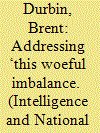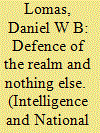|
|
|
Sort Order |
|
|
|
Items / Page
|
|
|
|
|
|
|
| Srl | Item |
| 1 |
ID:
140987


|
|
|
|
|
| Summary/Abstract |
From the wartime Office of Strategic Services to the contemporary Central Intelligence Agency (CIA), women have played a key role in US national intelligence. Yet, aside from episodic attention to the especially colorful lives of individual spies or analysts, few resources have been available to assess the broader status and service of these women. On 30 October 2013, the Central Intelligence Agency released the document collection From Typist to Trailblazer: The Evolving View of Women in the CIA's Workforce, a set of declassified files related to women's employment at the agency. This essay places these documents – which include personnel files, interagency memoranda, and internal CIA surveys and studies – into their broader institutional and social contexts, arguing that, despite the slow pace of change, CIA has made significant progress in addressing sex discrimination within its ranks.
|
|
|
|
|
|
|
|
|
|
|
|
|
|
|
|
| 2 |
ID:
140989


|
|
|
|
|
| Summary/Abstract |
This article leverages normative insights from the dyadic democratic peace literature to assess whether the configuration of regime types within an intelligence alliance can shape the depth of cooperation between its members. The Anglo-Soviet intelligence alliance (1941–45) is considered as an initial plausibility probe of this argument. Evidence is found to support the premise that cooperation between the intelligence services of a democracy and an autocracy is constrained by the absence of the democratic norms of bounded uncertainty and contingent consent. The article concludes with recommendations on how future scholarship can further explore the relationship between regime type and the depth of international intelligence cooperation.
|
|
|
|
|
|
|
|
|
|
|
|
|
|
|
|
| 3 |
ID:
140984


|
|
|
|
|
| Summary/Abstract |
In May 2013, a report on the British Security Service (MI5) by Sir Samuel Findlater Stewart was released by the Cabinet Office. Dated November 1945, the report on the future organization and activities of MI5 was significant in that it defined the Service's post-war remit, accountability and relations with the Secret Intelligence Service (SIS), laying the groundwork of MI5's mandate until the introduction of the Security Service Act in 1989. The article also suggests that the report is significant, not just because it sheds important light on MI5's wartime and post-war role, but because it helps question existing assumptions about the relationship between the Security Service and the post-war Labour Government of Clement Attlee, often viewed as a troubled one.
|
|
|
|
|
|
|
|
|
|
|
|
|
|
|
|
| 4 |
ID:
140983


|
|
|
|
|
| Summary/Abstract |
The rapid escalation of the CIA's drone program under the Obama administration has attracted the close attention of the media and academic experts. While such attention has helped shine a light on the scale, effectiveness and legality of drone warfare, there has been little attempt to explain the origins of the program and place it within wider US counterterrorism practice. This article meets that need. Drawing upon executive orders, national security directives, documents from the CIA's archive, memoirs of key individuals and technical specifications of drones themselves, the article demonstrates how the current drone campaign has its origins in America's first clash with international terrorism, fought against state sponsors such as the late Colonel Gaddafi. As such, the article concludes that the Obama administration's approach, whilst unique in scale, actually marks a return to, rather than a departure from, counterterrorism methods developed in the decades preceding 9/11.
|
|
|
|
|
|
|
|
|
|
|
|
|
|
|
|
| 5 |
ID:
140988


|
|
|
|
|
| Summary/Abstract |
The currently accepted narrative regarding WWII in China suggests that Nationalist China and the Third Reich had no diplomatic connections after their official break of diplomatic relations in July 1941. Based on archival material from Germany, China and Taiwan, this article challenges this narrative. As I hope to demonstrate, communications between Germany and China continued well after July 1941 through back channels. From Switzerland, Chinese agents maintained connections with the German party intelligence service (RSHA), and Germany acted as a mediator between China and Japan. It is the role that intelligence personnel played in maintaining this communication channel and their role in clandestine Sino-German relations, which form the foundation of this paper.
|
|
|
|
|
|
|
|
|
|
|
|
|
|
|
|
| 6 |
ID:
140986


|
|
|
|
|
| Summary/Abstract |
From 1941 to 1944, MI5 faced determined attempts to penetrate Allied Air Forces using trained pilot agents recruited by German Military Intelligence (Abwehr). The mission of these pilot agents was to gather military intelligence and to return to German held territory. This pattern of targeting Allied Air Forces has not been recognized by historians. This article examines MI5's responses to the threat using recently released files in the National Archives.
|
|
|
|
|
|
|
|
|
|
|
|
|
|
|
|
| 7 |
ID:
140985


|
|
|
|
|
| Summary/Abstract |
Counter-terrorism is a product of government, identifying as its target a kind of violence defined as terrorism. This article explores a particular moment in its development, as an intersection of international, national and bureaucratic responses to the Munich Olympics massacre of 1972. Australian understandings of the development of counter-terrorism have been dominated by a number of themes – principally by the Hilton Bombing of 1978 and the subsequent acceleration of security restructuring during the Fraser years, by the collapse of the Cold War focus of the security and intelligence agencies at the end of the 1980s and then by the ‘war on terror’ following 9/11 and the Bali bombing. Counter-terrorist planning was however an emerging business of government in the 1970s, in Australia as in its alliance partner the United States. While the Hope Royal Commission into intelligence agencies (1974–7) has dominated attention in later accounts of the development of counter-terrorism, a 1972 Interdepartmental Committee on Terrorism and Violence in Australia anticipated many of its concerns. In this developing concern with terrorism, the role and interest of the domestic intelligence agency (ASIO) at this time was limited. This paper contextualizes the Munich massacre as one of the factors shaping a rethinking of security and policing strategies in the early 1970s, a moment in the emergence of a modern government of terrorism.
|
|
|
|
|
|
|
|
|
|
|
|
|
|
|
|
|
|
|
|
|